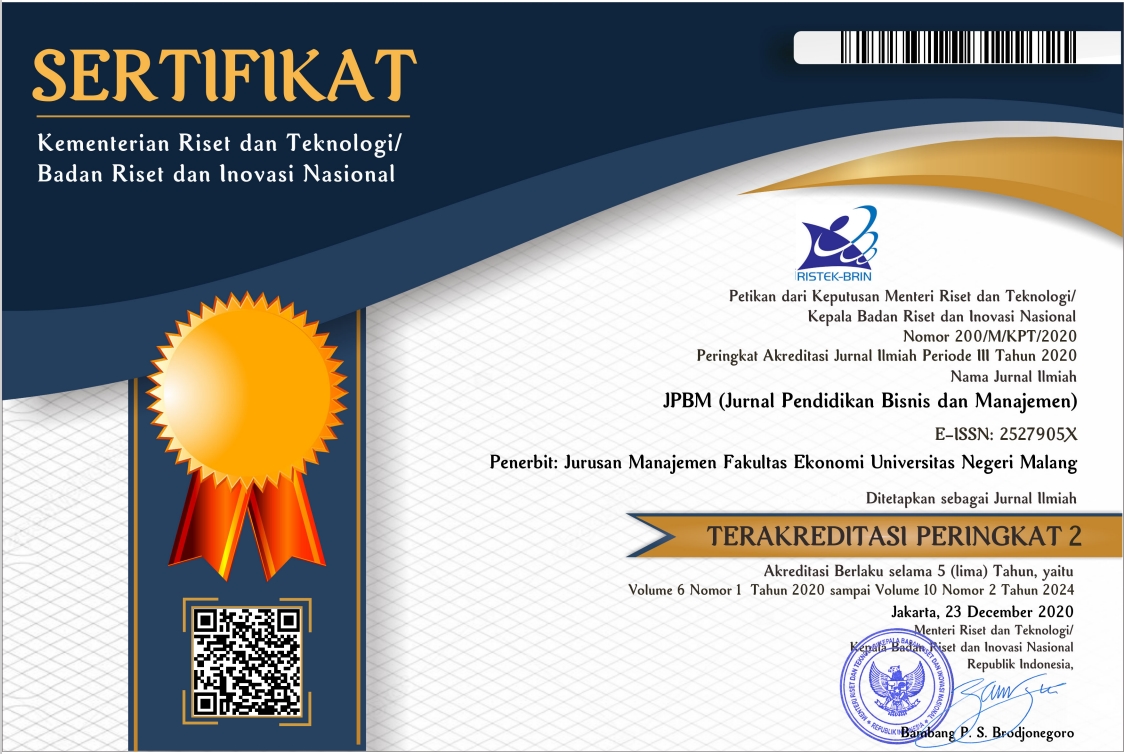Organizational Climate, Organizational Culture and Employee Performance: The Mediating Role of Job Satisfaction
Abstract
This study aims to analyze the effect of organizational climate and culture on employee performance by mediating job satisfaction. This study includes quantitative research using a questionnaire in data collection. The population in this study were employees of a 3-star hotel in Malang. The sampling technique used non-probability sampling with consecutive sampling types and 146 respondents were selected according to the characteristics of the study. The data analysis technique uses SEM (Structural Equation Modeling, PLS). The study results indicate the two independent variables have different effects on the dependent variable, particularly organizational climate which affects employee performance, while organizational culture does not directly affect employee performance. The results of mediation testing show that job satisfaction provides a mediating role both on the influence of organizational climate and culture on employee performance. This study proposes that hotel management needs to continue to maintain a positive organizational climate and organizational culture so that employees can consider job satisfaction which has an impact on employee performance.
Keywords: Organizational climate, organizational culture, job satisfaction, employee performance
Full Text:
PDFReferences
Al-Sada, M., Al-Esmael, B., & Faisal, M. (2017). Influence of organizational culture and leadership style on employee satisfaction, commitment and motivation in the educational sector in Qatar. EuroMed Journal of Business, 12(2), 163–188. https://doi.org/10.1108/EMJB-02-2016-0003
Arifin, A., Saputra, J., Puteh, A., & Qamarius, I. (2019). The role of organizational culture in the relationship of personality and organization commitment on employee performance. International Journal of Innovation, Creativity and Change, 9(3), 105–129.
Behery, M., Paton, R., & Hussain, R. (2012). Psychological contract and organizational commitment: The mediating effect of transformational leadership. Competitiveness Review, 22(4), 299–319. https://doi.org/https://doi.org/10.1108/10595421211247141
Cameron, K., & Quinn, R. (2011). Diagnosing and Changing Organizational Culture: Based on the Competing Values Framework (3rd ed.). Jossey-Bass.
Castro, M., & Martins, N. (2010). The relationship between organisational climate and employee satisfaction in A South African information and technology organization. SA Journal of Industrial Psychology, 36(1), 1–9. https://doi.org/10.4102/sajip.v36i1.800
Chin, W. (1998). The partial least squares approach to structural equation modelling. Modern Methods for Business Research, 295–336.
Datta, A., & Singh, R. (2018). Determining the dimensions of organizational climate perceived by the hotel employees. Journal of Hospitality and Tourism Management, 36, 40–48. https://doi.org/https://doi.org/10.1016/j.jhtm.2018.07.001
Davidson, M. C. G. (2000). Organisational climate and its influence upon performance: A study of australian hotels in south east queensland. In Management Faculty of Commerce and Management. Griffith University.
Deal, T., & Kennedy, A. (1983). Corporate cultures: The rites and rituals of corporate life. Business Horizons, 26(2), 82–85. https://doi.org/https://doi.org/10.1016/0007-6813(83)90092-7
Evans, J., & Lindsay, W. (2014). Managing for quality and performance excellence (9th ed.). Cengage Learning.
Gabcanova, I. (2012). Human resources key performance indicators. Journal of Competitiveness, 4(1), 117–128. https://doi.org/10.7441/joc.2012.01.09
Ghozali, I., & Latan, H. (2015). Partial least squares: Konsep, teknik dan aplikasi menggunakan program SmartPLS 3.0. Badan Penerbit Undip.
Hair, J., Hult, G., Ringle, C., & Sarstedt, M. (2016). A primer on partial least squares structural equation modeling (PLS-SEM) (2nd ed.). Sage Publications, Inc. http://hdl.handle.net/11420/4083
Hanzaee, K., & Mirvaisi, M. (2013). A survey on impact of emotional intelligence, organizational citizenship behaviors and job satisfaction on employees’ performance in Iranian hotel industry. Management Science Letters, 3, 1395–1402. https://doi.org/10.5267/j.msl.2013.04.010
Harwiki, W. (2016). The Impact of servant leadership on organization culture, organizational commitment, organizational citizenship behaviour (ocb) and employee performance in women cooperatives. Procedia - Social and Behavioral Sciences, 219, 283–290. https://doi.org/10.1016/j.sbspro.2016.04.032
Kaya, Ç., & Başkaya, R. (2016). The roles of organizational and ethical climate on individual performance of employees. Business Management Dynamics, 5(8), 27–38.
Kaya, N., Koc, E., & Topcu, D. (2010). An exploratory analysis of the influence of human resource management activities and organizational climate on job satisfaction in Turkish Banks. The International Journal of Human Resource Management, 21(11), 2031–2051. https://doi.org/https://doi.org/10.1080/09585192.2010.505104
Koo, B., Yu, J., Chua, B., Lee, A., & Han, H. (2020). Relationships among emotional and material rewards, job satisfaction, burnout, affective commitment, job performance, and turnover intention in the hotel industry. Journal of Quality Assurance in Hospitality & Tourism, 21(4), 371–401. https://doi.org/https://doi.org/10.1080/1528008X.2019.1663572
Lawler, E., & Bordeau, J. (2007). What makes HR a strategic partner? Center for Effective Organizations (CEO), 1(213), 1–23.
Lee, M., & Kim, H. (2017). Exploring the organizational culture’s moderating role of effects of corporate social responsibility (CSR) on firm performance: Focused on corporate contributions in Korea. Sustainability, 9(10), 1883. https://doi.org/10.3390/su9101883
Li, Y., & Mahadevan, A. (2017). A study on the impact of organisational climate on employee performance in A Malaysian consltancy. International Journal of Accounting & Business Management, 5(1), 1–13.
Lok, P., & Crawford, J. (1999). Commitment and organizational culture, subculture, leadership style and job satisfaction in organizational change and development. Leadership & Organization Development Journal, 20(7), 365–374. https://doi.org/https://doi.org/10.1108/01437739910302524
Lund, D. (2003). Organizational culture and job satisfaction. Journal of Business & Industrial Marketing, 18(3), 2019–2236. https://doi.org/https://doi.org/10.1108/0885862031047313
Manik, E. (2016). The influence of transformational leadership on achievement motivation and organizational climate and employee performance. International Journal of Academic Research in Business and Social Sciences, 6(12), 599–608. https://doi.org/10.6007/ijarbss/v6-i12/2522
Obeng, A., Zhu, Y., Azinga, S., & Quansah, P. (2021). Organizational climate and job performance: investigating the mediating role of harmonious work passion and the moderating role of leader–member exchange and coaching. Sage Open, 1–14. https://doi.org/10.1177/21582440211008456
Pawirosumarto, S., Sarjana, P., & Gunawan, R. (2017). The effect of work environment, leadership style, and organizational culture towards job satisfaction and its implication towards employee performance in parador hotels and resorts, Indonesia. International Journal of Law and Management, 59(6), 1337–1358. https://doi.org/https://doi.org/10.1108/IJLMA-10-2016-0085
Plessis, A., Douangphichit, N., & Dodd, P. (2015). HRM in relation to employee motivation and job performance in the hospitality industry. Journal of International Business Research and Marketing, 1(4), 12–21. https://doi.org/10.18775/jibrm.1849-8558.2015.14.3002
Prabowo, T., Noermijati, & Irawanto, D. (2018). Leadership and work motivation on employee performance mediated. Journal of Applied Management (JAM), 16(1), 171–178. https://doi.org/http://dx.doi.org/10.21776/ub.jam.2018.016.01.20
Rahimic, Z. (2013). Influence of organizational climate on job satisfaction in Bosnia and herzegovina companies. International Business Research, 6(3), 129–139. https://doi.org/10.5539/ibr.v6n3p129
Sami, P., Sabri, U., Ilyas, M., & Amjad, Z. (2011). Organizational culture and its impact on the job satisfaction of the university teachers of Lahore. International Journal of Business and Social Science, 2(24), 121–129. http://www.ijbssnet.com/journals/Vol_2_No_24_Special_Issue_December_2011/13.pdf
Shahzad, F. (2014). Impact of organizational culture on employees’ job performance: An empirical study of software houses in Pakistan. International Journal of Commerce and Management, 24(3), 219–227. https://doi.org/https://doi.org/10.1108/IJCoMA-07-2012-0046
Siengthai, S., & Pila-Ngarm, P. (2017). Job redesign and employee performance: The mediating effects of human capital investment and job satisfaction. Organization Development Journal, 35(2), 79–99.
Sihombing, S., Astuti, E., Musadieq, M., Hamied, D., & Rahardjo, K. (2018). The effect of servant leadership on rewards, organizational culture and its implication for employee’s performance. International Journal of Law and Management, 60(2), 505–516. https://doi.org/https://doi.org/10.1108/IJLMA-12-2016-0174
Syardiansah, Latief, A., Daud, M., & Suharyanto, A. (2020). The effect of job satisfaction and organizational culture on employee performance of the royal hotel in East Aceh District. Budapest International Research and Critics Institute (BIRCI-Journal) : Humanities and Social Sciences, 3(2), 849–857. https://doi.org/https://doi.org/10.33258/birci.v3i2.912
Tarba, S., Ahammad, M., Junni, P., Stokes, P., & Morag, O. (2019). The Impact of organizational culture differences, synergy potential, and autonomy granted to the acquired high-tech firms on the M&A Performance. Group and Organization Management, 44(3), 483–520. https://doi.org/10.1177/1059601117703267
Tepeci, M., & Bartlett, A. (2002). The hospitality industry culture profile: A measure of individual values, organizational culture, and person–organization fit as predictors of job satisfaction and behavioral intentions. International Journal of Hospitality Management, 21(2), 151–170. https://doi.org/https://doi.org/10.1016/S0278-4319(01)00035-4
Tran, Q. (2020). Organisational culture, leadership behaviour and job satisfaction in the Vietnam Context. International Journal of Organizational Analysis, 29(1), 136–154. https://doi.org/https://doi.org/10.1108/IJOA-10-2019-1919
Tsai, C. (2014). The organizational climate and employees’ job satisfaction in the terminal operation context of Kaohsiung Port. Asian Journal of Shipping and Logistics, 30(3), 373–392. https://doi.org/10.1016/j.ajsl.2014.12.007
Tsui, P., Lin, Y., & Yu, T. (2013). The influence of psychological contract and organizational commitment on hospitality employee performance. Social Behavior and Personality: An International Journal, 41(3), 443–452. https://doi.org/https://doi.org/10.2224/sbp.2013.41.3.443
Weiss, D., Dawis, R., & England, G. (1967). Manual for the Minnesota Satisfaction Questionnaire. Minnesota Studies in Vocational Rehabilitatio, 22(120).
Welbourne, T., Johnson, D., & Erez, A. (2017). The role-based performance scale: Validity analysis of A Theory-Based Measure. Academy of Management Journal, 41(5). https://doi.org/https://doi.org/10.5465/256941
Refbacks
- There are currently no refbacks.
JPBM (Jurnal Pendidikan dan Bisnis Manajemen) is licensed under a Creative Commons Attribution-NonCommercial-ShareAlike 4.0 International License.
JPBM (Jurnal Pendidikan dan Bisnis Manajemen) is abstracted and indexed in :
















